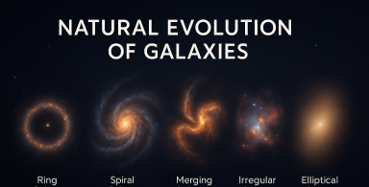
Cosmic Seed Theory: The Natural Evolution of Everything
Cosmic Seed Theory: The Natural Evolution of Everything
A Living Universe. A Cyclical Cosmos. A Model Rooted in Nature.
Cosmic Seed Theory (CST) began as a bold challenge to the standard Big Bang model—but it has grown into something much deeper. It’s no longer just a cosmological framework.
It’s a reflection of nature itself.
CST doesn’t simply ask how the universe began. It asks how the universe lives.
From the swirling birth of galaxies to the slow churn of black holes, CST reveals a cosmos that grows, evolves, and renews—just like every other system in nature.
The Universe, by Natural Design
Instead of requiring magical beginnings or theoretical patches like inflation and dark matter, CST is built on natural, observable processes:
- No singularity
- No divine spark
- No invisible scaffolding holding it all together
Just pressure, motion, energy, and time.
The same forces that shape clouds, ecosystems, and life itself.
The CST Life Cycle: A Universe That Evolves Like Nature
Stage 1: The Ocean of Spacetime
An infinite field of swirling filaments of energy—the foundation of everything.
These filaments ripple, collide, and fluctuate, gradually forming dense regions—like clouds forming in an endless sky.
Stage 2: Particle Emergence
Some fluctuations stabilize into real particles.
Others collapse into primordial black holes, becoming particle factories—ghost machines churning energy into matter across vast time.
Stage 3: Star & Galaxy Formation
Hydrogen forms. Stars ignite.
Galaxies begin to self-assemble—not from a sudden explosion, but from an internal process of gravitational flow and cosmic self-organization.
Stage 4: Accumulation & Pressure
Black holes grow. Galaxies merge.
Matter compresses. Pressure builds.
These forces converge into Cosmic Seeds—ultra-dense black holes on the verge of a transformation.
Stage 5: Expansion Event (Galactic Big Bang)
At critical mass, something changes.
Gravity flips. A repulsive force ignites.
A Galactic Big Bang erupts—not the origin of the universe, but the rebirth of a region. New stars, rings, and dwarf galaxies burst outward.
Stage 6: Dwarfs, Rings, and Aftermath
The debris scatters. Some fragments become orbiting satellites.
Others drift into the void—seeds for future galaxies, or isolated wanderers in an expanding sea.
Stage 7: Rebuilding and Rebirth
Gas rains back in.
Star formation resumes.
The black hole at the center stabilizes.
The galaxy begins again—new arms, new stars, new life.
CST as a Law of Natural Evolution
CST isn’t just a new model of cosmology—it’s a law of natural evolution scaled up to the galactic level.
It mirrors biology, geology, ecosystems, even consciousness:
- It grows
- It ages
- It reproduces
- It inherits structure and motion
- And it evolves
There are no miracles in CST.
Just motion. Just time. Just energy.
It’s the natural history of everything.
A Living Universe
The cosmos is not a static artifact.
It’s not a one-time event frozen in background radiation.
It is alive.
It breathes, pulses, recycles, and evolves—through the births and renewals of billions of galactic Big Bangs.
Cosmic Seed Theory doesn’t just explain the universe.
It shows us that we are part of it.
Not an accident.
Not a coincidence.
But a continuation of nature’s deepest rhythm.
Welcome to the natural evolution of everything.
Let’s rediscover the cosmos—together.
